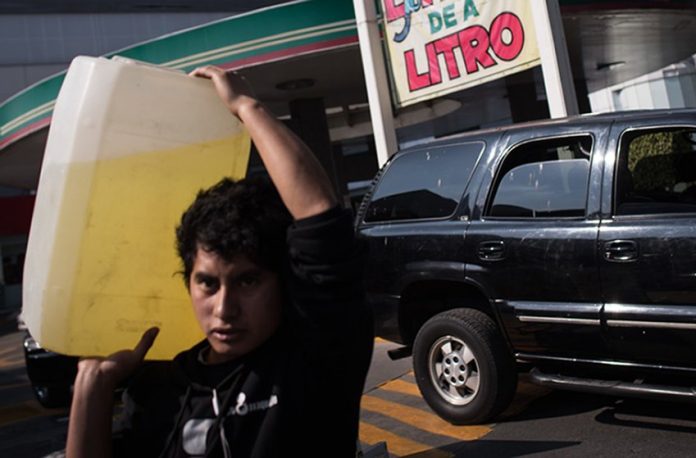Mexico has significantly reduced gasoline imports from the United States since Andrés Manuel López Obrador was sworn in as president on December 1, according to a United States research firm.
The period in which they were cut back partially coincides with the current widespread fuel shortage that the government has explained is the result of López Obrador’s decision to close several major petroleum pipelines as part of the strategy to combat fuel theft.
A report published yesterday by The Wall Street Journal (WSJ) cited data from Houston and New York-based ClipperData which shows that under the new government, seaborne gasoline imports from the United States’ Gulf Coast have averaged around 350,000 barrels a day.
The number represents a 28% decline on the quantity of U.S. gasoline imported in December 2017 and January 2018 when former president Enrique Peña Nieto was in office, according to ClipperData.
During the first 10 days of January, a period in which the fuel shortage progressively spread and worsened, gasoline imports from the U.S. Gulf Coast dropped further, averaging about 254,000 barrels a day, a 33% decline on last month and a 45% decline on January 2018 imports.
The WSJ said that, according to industry analysts and government officials, the decline is the result of fewer orders for American gasoline as well as congestion at Mexico’s Gulf Coast ports.
Forty foreign oil tankers were stranded at the Veracruz and Tuxpan fuel terminals yesterday, where they were waiting to unload several million barrels of gasoline.
According to shipping experts, the tankers are unable to offload their cargo because port storage facilities are full due to the closure of petroleum pipelines.
A Pemex spokeswoman said the slowdown in U.S. gasoline imports in January was due to seasonal factors, noting that December is usually the month when gasoline is most in demand in Mexico.
But the decline in imports between December and January is over four times greater than that recorded over the past four years when, according to the U.S. Energy Information Agency, the month-on-month slowdown averaged 8%.
There are other factors that appear to be contributing to the prolonged fuel shortage.
The WSJ said the shortages have “laid bare the inefficiencies of Mexico’s refineries.” According to Pemex figures, the nation’s six refineries operated at a daily capacity of 46.1% last year through November.
The situation has also “raised questions about the new administration’s reversal of steps taken by the previous government to begin importing light crude, necessary for mixing with Mexico’s heavy Maya crude at refineries to produce gasoline.”
A person familiar with oil imports to Mexico told the WSJ that all Mexican tenders for U.S. light crude have halted.
Monserrat Ramiro, a commissioner on Mexico’s Energy Regulatory Commission, said the current crisis is the result of years of insufficient investment in logistics infrastructure such as storage tanks, pipelines and fuel terminals.
López Obrador, who has pledged to “rescue” Mexico’s oil sector by upgrading existing refineries and building a new one on the Gulf Coast in Tabasco, has said repeatedly that the current gasoline shortage is due to logistics rather than a lack of supply.
Responding to a question today about the WSJ story, he said, “It’s not true,” and suggested the newspaper was not reliable.
Published yesterday afternoon, the story triggered intense debate on social media about the root cause or causes of the gasoline shortage.
Many social media users posted the story as evidence that López Obrador, commonly known as AMLO, had created the shortage crisis on purpose by cutting imports. But one of two WSJ journalists who wrote the article said that the story doesn’t support that claim.
“A lot of Mexican Twitter is retweeting this story as proof that AMLO caused the gasoline crisis on purpose by cutting imports of U.S. fuel and light crude, and is using the huachicol crackdown as a pretext . . .that’s NOT what the story says,” Robbie Whelan wrote.
In an earlier tweet, he wrote: “Mexico’s gasoline supply is paralyzed by closed fuel pipelines, but there are other factors: Pemex refining and downstream infrastructure are a mess, AMLO has stopped importing U.S. light crude, and January daily import volumes are down 45% from 2018.”
John M. Ackerman, a law professor at the National Autonomous University (UNAM) and husband of federal Secretary of Public Administration Irma Eréndira Sandoval, wrote to Whelan on Twitter, stating that “official data on Mexican imports are not out yet,” charging that the WSJ “article is based on speculations and data provided by a little known shipment company.”
Whelan responded that “we wouldn’t have cited ClipperData if we weren’t confident in their data and if we hadn’t checked their claims against observations (not speculation) of industry sources.”
Carlos Bravo Regidor, a political analyst and associate professor at CIDE, a research university in Mexico City, supported Whelan’s position.
“Is it a story about huachicol crackdown as a smoke screen? No. Is it a story about the deliberate creation of a crisis? No. To me, it is a story about unforeseen logistical complications (incompetence, in brief),” he wrote on Twitter.
Source: Wall Street Journal (en)
